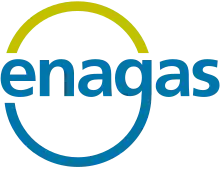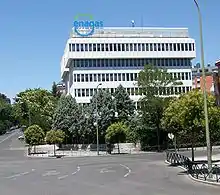Enagás
Enagás, S.A. (Spanish pronunciation: [enaˈɣas], originally an initialism for Empresa Nacional del Gas) is a Spanish energy company and European TSO, which owns and operates the nation's gas grid. The firm also owns four liquefied natural gas regasification terminals in the country,[2] at Huelva, Barcelona, Cartagena and Gijon.[3] In addition, it owns 50% of the plant BBG (Bilbao) and 100% of Gascan. The chairman of Enagás is Antonio Llardén Carratalá and his Chief Executive Officer is Marcelino Oreja Arburúa. The firm's headquarters are located in Madrid. Apart from Spain, Enagás has presence in Mexico, Perú, Chile, Sweden and in the Trans Adriatic Pipeline (TAP) European project.
 | |
 Headquarters in Madrid, Spain | |
| Type | Sociedad Anónima |
|---|---|
| BMAD: ENG | |
| ISIN | ES0130960018 |
| Industry | Energy industry |
| Founded | 1972 |
| Headquarters | Madrid, Spain |
Key people | Antonio Llardén Carratalá (Chairman) Marcelino Oreja Arburúa (CEO) |
| Products | Storage and transportation of natural gas |
| Revenue | |
Number of employees | |
| Website | www.enagas.com |
The company was founded in 1972 by the Spanish Government with the aim of creating a nationwide network of gas pipelines. After privatisation in 1994, Gas Natural acquired a controlling stake in the company. Since Enagás demerged in 2002, Gas Natural gradually decreased its stake to 5%, the maximum allowed for any shareholder by the Government after 30 December 2006. As of 2006, the institutional shareholder was the state-owned holding company Sociedad Estatal de Participaciones Industriales (SEPI) which held 5% of Enagás.
In 2015, about 95% of the company's shares were on the open market.
In 2011, the €3.1 billion MidCat gas pipeline project between France and Spain was kicked off; a first section near Barcelona was built in 2011–2012.[5] With 7 million in EU support for prestudies the project came to a halt, however. [5] The first part of the pipeline called the South Transit East Pyrenees, or STEP, was to continue the existing line near Barcelona into France for about €440 million, paid mostly by the French partner Teréga, which is recently renamed TGIF by Total. Construction was to start 2019 and be completed by 2022. The second half of MidCat was to reinforce about 800 km of pipelines within France. A 2017 EU report found that MidCat's costs were higher than its assumed benefits.[5]
References
- "Annual Report 2017" (PDF). Enagás. Retrieved November 19, 2020.
- Roberts, Martin (7 April 2008). "World's biggest LNG tanker unloads at Enagas plant". Reuters. Retrieved 2008-12-31.
- "Gas Transmission: Infrastructure". Enagás. Archived from the original on 2006-11-22. Retrieved 2008-12-31.
- Anca Gurzu The Franco-Spanish ghost gas pipeline Politico, 31 October 2018